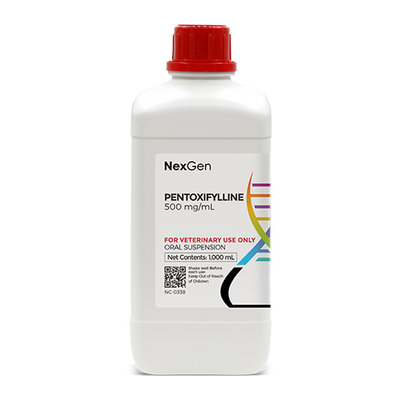
Chloramphenicol 500 mg/mL, Oral Suspension, (1000mL)
Login for pricing
- Brand
- Mixlab
- SKU:
- NC-0111
- Product Type:
- Suspension
- Size:
- 1000ml
- Administration:
- Oral
Chloramphenicol is a broad-spectrum bacteriostatic antibiotic that works by preventing bacteria from growing or reproducing. It is effective against many types of bacteria and is easily absorbed orally and easily distributed throughout the body.1 According to the literature, Chloramphenicol has good penetration to most tissues, including the eye, CNS, and prostate.2
Chloramphenicol acts as a time-dependent, bacteriostatic antibiotic, but at higher concentrations or against some susceptible organisms, it can be bactericidal. Chloramphenicol acts by binding to the 50S ribosomal subunit of susceptible bacteria, thereby preventing bacterial protein synthesis.
Chloramphenicol has a wide spectrum of activity against many aerobic and anaerobic gram-positive and gram-negative organisms. Gram-positive aerobic organisms that are generally susceptible to chloramphenicol include many streptococci and staphylococci.
In horses, chloramphenicol and related medications are often used to treat strangles, a highly contagious upper respiratory infection of equines caused by the bacteria Streptococcus equi. In cases of S. equi infection, the bacteria is transmitted by inhalation or direct contact with contaminated surfaces (such as horses sharing water buckets). The bacteria colonize the horse’s tonsils and pharynx, and then infect the lymph nodes under and behind the jaw, resulting in abscessation.3
Chloramphenicol should be used with caution in animals with impaired hepatic or renal function. Because of the potential for hematopoietic toxicity, the drug should be used with extreme caution, if at all, in animals with preexisting hematologic abnormalities. Caution is indicated in the administration of chloramphenicol to cats, as dosages for dogs and cats are significantly different.2
Chloramphenicol 500mg/ml 1000 ml by NexGen provides excellent relief from bacterial infections in small animals and horses, particularly those caused by anaerobic bacteria.
FOR RX ONLY: A valid prescription from a licensed veterinarian is required for dispensing this medication.
1equimed.com.
2Plumb's Veterinary Drugs.
3vetspecialists.com.








